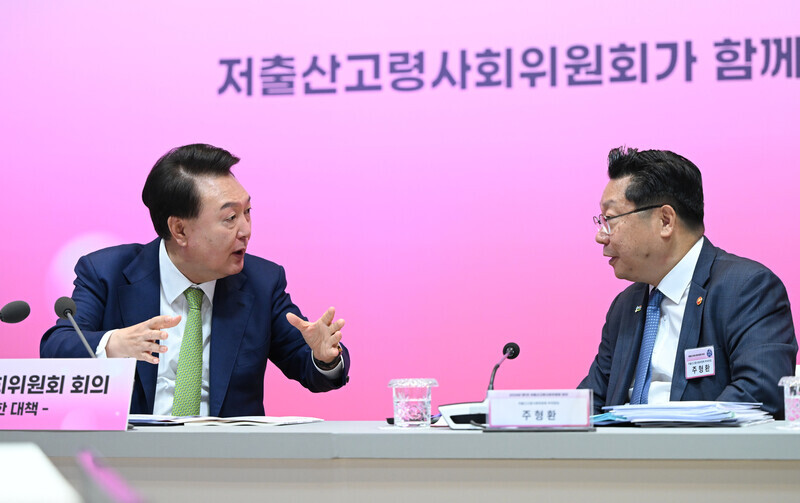hankyoreh
Links to other country sites 다른 나라 사이트 링크
[Editorial] Exploiting foreign domestic workers won’t solve Korea’s birth rate problem

On June 19, the South Korean government announced measures to fight the country’s plummeting birth rate and shrinking population. As part of this announcement, the administration proposed exempting foreign housekeeping workers and domestic helpers from the minimum wage, an announcement that has proved controversial. The administration has faced similar backlash regarding other policy proposals, but has ultimately decided to adhere to the minimum wage law instead of risking the blowback from discriminatory policies. Now, however, the administration is attempting to reinsert the same policy into its demographic measures.
The government’s proposal goes as follows. The state will allow 1,200 foreign domestic workers to come to Korea on the non-professional employment permit system visa (E-9) in the first half of 2025, while also allowing an additional 5,000 migrants — namely, spouses of migrant workers and foreign students studying in Korea — to work in the country at lower than the legal minimum wage.
Under current laws, if a domestic worker or housekeeper is employed by a state-approved agency, the minimum wage law applies. However, if the domestic helper is not employed by a state-approved agency and is directly hired by individual households, minimum wage laws do not apply. The administration is basically using this legal loophole to inject foreign labor into the market at a fraction of the cost. Furthermore, the state is considering the approval of private broker agencies that would connect these laborers to consumers.
Domestic workers, including housekeepers, have only recently been granted legal protections pursuant to the Act on the Employment Improvement of Domestic Workers, which was enacted in 2022. Yet the current administration is taking the anachronistic step of reversing these protections and encouraging unofficial employment contracts.
The state openly announcing discriminatory policies also flies in the face of international standards. According to Convention No. 111 of the International Labour Organization, discrimination in labor contracts according to nationality, sex, or religion is not permissible. Experts are concerned that exempting domestic work like housekeeping and nanny services from minimum wage laws would encourage migrant workers to quit their jobs and thus become undocumented sojourners.
Moreover, before there has even been a proper assessment of the pilot project to bring in domestic workers from the Philippines this September, the administration is already announcing plans to expand the scope of the policy. In a joint statement issued on June 20 with the Korean Confederation of Trade Unions, major Philippine labor movements demanded that contracts for Filipino caregivers be transparent and accessible, that there be regular inspections of housing facilities for workers, and that trade unions play a role in training programs.
In January, the government of the Philippines suspended its deployments of seasonal laborers to Korea as a result of a litany of reported labor abuses, including wage theft. Labor organizations in the Philippines criticized the South Korean government for having not come up with any measures to remedy such abuses despite this.
Korea’s plan to encourage private contracts between individual families and domestic care workers will only set the stage for all sorts of rights abuses. The Korean government must heed criticism that its myopic focus on cheap labor without careful consideration of its ramifications will only create bigger problems.
Please direct questions or comments to [english@hani.co.kr]

Editorial・opinion
![[Correspondent’s column] China-Europe relations tested once more by EV war [Correspondent’s column] China-Europe relations tested once more by EV war](https://flexible.img.hani.co.kr/flexible/normal/500/300/imgdb/original/2024/0628/7617195640940814.jpg) [Correspondent’s column] China-Europe relations tested once more by EV war
[Correspondent’s column] China-Europe relations tested once more by EV war![[Correspondent’s column] Who really created the new ‘axis of evil’? [Correspondent’s column] Who really created the new ‘axis of evil’?](https://flexible.img.hani.co.kr/flexible/normal/500/300/imgdb/original/2024/0628/4017195633070654.jpg) [Correspondent’s column] Who really created the new ‘axis of evil’?
[Correspondent’s column] Who really created the new ‘axis of evil’?- [Editorial] Exploiting foreign domestic workers won’t solve Korea’s birth rate problem
- [Column] Kim and Putin’s new world order
- [Editorial] Workplace hazards can be prevented — why weren’t they this time?
- [Editorial] Seoul failed to use diplomacy with Moscow — now it’s resorting to threats
- [Column] Balloons, drones, wiretapping… Yongsan’s got it all!
- [Editorial] It’s time for us all to rethink our approach to North Korea
- [Column] Why empty gestures matter more than ever
- [Editorial] Seoul’s part in N. Korea, Russia upgrading ties to a ‘strategic partnership’
Most viewed articles
- 1Dreams of a better life brought them to Korea — then a tragic fire tore them apart
- 2Yoon echoed conspiracy theories about Itaewon disaster, former National Assembly speaker says
- 3S. Korea joins US, Japan for first multi-domain drills at a time of escalating tensions
- 4South Korea creates more US jobs via direct investment than any other county
- 5CIA record confirms US ‘completely destroyed’ Seoul’s Haebangchon in 1950 bombardment
- 6[Editorial] Seoul’s part in N. Korea, Russia upgrading ties to a ‘strategic partnership’
- 7[Column] Why empty gestures matter more than ever
- 8Foreign day laborers make up majority of death toll in Korean battery factory fire
- 9[Editorial] Exploiting foreign domestic workers won’t solve Korea’s birth rate problem
- 10Son Heung-min’s father, brother accused of child abuse at football academy